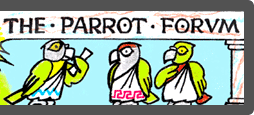I found a ten year old Female Meyers three hours from me...In Mass... She aparantly is missing a couple of toes. (the owner does not know why) and has been in cage mainly because the owner is afraid she will attack the other parrots they own. The owner told me that initially, they let the meyers out at the same time with another and immediately she went into the others cage and beat it up badly. This is just a relayed message. I'm posting the details i know about because i feel bad for it and seems she really needs a new home with someone who can give it attention and out of cage time. Otherwise, i think i need to stop keeping my eyes out for another bird because of my limited space and time currently incase they were not to bond...thought the idea of them keeping each other company tugs at me... Though i am satisfied that he still has it good because I give him quality time every day/trick training for ten minutes and flight training for twenty minutes/showers with me not outside the shower where we also do whistle toons while hes on his perch...some play and roaming time at least a couple hours on a busy long day but more on off days, food that includes fresh now and solar light schedule and hopefully this week an enlarged cage. Anyway... when i read conflicting articles and messages regarding parrots should or should not be homed together. Heres one article that came up in reading:
Pets
Wing It - Bird Behavior
Bird to Bird Fighting
Birds Not of a Feather
If you've had dogs and cats as pets in the past, you may have kept two of either species, or one of each, a dog and cat, who were good companions for each other. When you consider how much time you spend at work and social activities, you might think that getting a bird companion for your parrot is the right thing to do. It doesn't always work out that way with parrots.
For starters, parrots are not brought up lovingly by their parents. They are taken from their parrot parents and raised (or "hand fed") by people. This is on purpose, to make sure that the parrot is closely bonded to people and associates them with nurturing and warm food. Parrots are intelligent creatures, with many learned behaviors that develop over the first year or more of their life. They learn to associate with a human flock and to behave like a person, even imitating our language. Your hand fed pet parrot doesn't necessarily know he's a bird or know how to relate in a bird-like way with other birds. For this reason, he might not relate to or accept another bird in your household. And, he could easily become jealous of the time you spend with a new bird. Parrots bond closely with their mates. In your household, it may be you with whom a parrot bonds.
As we've mentioned before, parrots belong to some three hundred different species. Two parrots native to different continents and different environments don't necessarily commune or communicate in the same way. Cockatoos from Indonesia can raise their crests to communicate and intimidate. Amazons from South and Central America flash colored patches on their wings and fan their tails to send the same message. Indian ringnecks don't exhibit the bonding and preening behaviors of Australian species. Parrots can control the widening and narrowing of their pupils. Such flashing eyes may mean something is intriguing to an African Grey, but may mean aggression in a yellow-naped Amazon parrot. It' no wonder that parrots seldom form close bonds with other parrots in the household.
Most people with several parrots have as many cages and play stands as they have parrots. Don't expect your parrots to co-exist or to play with each other. Each parrot has a special relationship with you, which of course can cause jealousy among the parrots. Birds of the same species can learn to tolerate each other and can also become good friends. Sometimes birds of different species bond, it's not impossible, but is not expected behavior either.. Since we still can't easily neuter companion birds, you'll be wise to buddy up birds of the same sex or to minimize stimuli to breed.
Breeding behavior can certainly cause some jealousy between parrots. Male cockatoos are notorious for exhibiting violent behavior towards their mates, mutilating them viciously by ripping off their beaks. Be aware of this behavior and don't let it happen at your house!
Meet and Greet
When parrots are first meeting each other, closely supervise their behavior towards each other. Let them out of their cages and keep them away from anything they might consider their own territory when they meet. Don't put two parrots on the same perch to meet each other. Put them on separate perches in neutral territory. Then watch how the parrots interact and react to each other. Are the birds interested in each other, aggressive towards each other or curious about a new parrot in the household?
Cockatiels should meet each other this way, and eventually should be able to be housed together. Parrots in the same family of birds may get along. Conures may buddy up, macaws, cockatoos, small African parrots and less often Amazons will be able to have a cagemate or playmate. Because of violence toward another bird, it is not advisable to introduce lovebirds to each other, male/female pairs of cockatoos as cagemates and most Amazon parrots. It is rarer that birds from different families of birds will accept each other and can play or interact safely. Most likely they will exhibit some curiosity towards the new bird in the flock and come to accept them. They'll tolerate another parrot living their own life on their own, separate perch that is! You will need to watch initial interactions and be aware of the dynamics of friendship in your flock if you have several parrots.
Special Time With Each Bird
When your bird exhibits jealousy towards another bird, he is acting out his wish for more of your attention. There should be a special interaction between you and each bird in your flock on a daily basis. Perhaps one parrot showers with you, or the flock members take turns having play time on a blanket spread with toys on the floor. You probably know what foods each parrot especially enjoys and can find a time of the day when you give each one this treat.
Parrots are very visual. They watch you and your interactions with your family and with your other pets. You may wish to make "special time" for each parrot with you in a room where you aren't observed by the rest of the flock.
Use Jealousy to Your Advantage!
When a parrot sees you interact with another parrot, jealousy shows up as an attention-getting behavior. The jealous parrot will vocalize, or may flutter its wings in a stance that says "come pick me up." He may pace back and forth in his cage. If a jealous bird isn't easy to handle, or doesn't like to be scratched, or doesn't step "up" easily, you can use its jealousy to teach it one of these behaviors.
For example, a parrot may learn a new word from a rival parrot if he sees you react to it. He may learn to put his head down to be scratched if you spend time with a rival parrot grooming her in this way. You can demonstrate the "up" command with another parrot, and a jealous parrot observing the behavior of both you and another parrot may well learn the command easier. He'll observe that this gets your attention and praise and want that for himself.
An Alternative: Getting Your Parrot A Pet
If you are concerned about your parrot being lonely, there are alternatives to getting another parrot. When you get another parrot you're really getting yourself another pet. You could get your parrot a pet of its own. Parrots can be intrigued by the flitting of a canary, or can watch a guinea pig or rat scamper around. A parrot will not develop sexual attractions for his pet, will be entertained when you're not home. Obviously, you have to want such a pet and know how to care for it as well. Parrots are often likened to 2 year olds, and they can't be responsible for care of another animal.
There are other alternatives for entertaining a solitary parrot:
Play Music
Observation of Wild Birds
Leave TV on
Wood or Paper to Shred
Change Toys Often
Teach Words or Tricks
Have a Friend Drop By
Parrot Day Camp
Inadvertent Reinforcement
If you're playing favorites among your parrots, this action is not going unnoticed by the rest of the flock. It's probably easiest to shower attention on the parrot who is the most cuddly and well behaved. This only increases the jealousy of a parrot who wants your attention. You may inadvertently encourage jealous behavior if you reward it. To your parrot, reward consists of your attention or a treat. If a jealous parrot consistently attacks another bird in your household, and when he does so you go pick him up and start talking to him, then he'll continue the attacks. He wants your attention and some social time with you. Provide it at other times. If you can see a parrot is heading for trouble, re-direct his attention to a game, play, treat or other activity. Notice your behavior towards your parrot and where you may be making reinforcing an unwanted behavior by rewarding it.



Parrots attacking other Parrots
3 posts • Page 1 of 1
Parrots attacking other Parrots
Piccolo and Pod
-

DanaandPod - Poicephalus
- Gender:

- Posts: 359
- Location: Connecticut
- Number of Birds Owned: 3
- Types of Birds Owned: male Jardines parrot, a female meyers parrot, and two budgies
- Flight: Yes
Re: Parrots attacking other Parrots
That is a very well presented article, Dana, thank you for sharing it with us, I don't know how well a parrot would be entertained by a rat or guinea pig because I don't want either of them. I know some people use the TV for their parrots, I personally don't because I think that it is not the easiest on their eyes, I don't find anything else in the article that I don't agree with to some extent.
- Wolf
- Macaw
- Gender:

- Posts: 8679
- Location: Lansing, NC
- Number of Birds Owned: 6
- Types of Birds Owned: Senegal
African Grey (CAG)
Yellow Naped Amazon
2Celestial Parrotlet
Budgie - Flight: Yes
3 posts • Page 1 of 1
Return to Taming & Basic Training
Who is online
Users browsing this forum: No registered users and 8 guests
